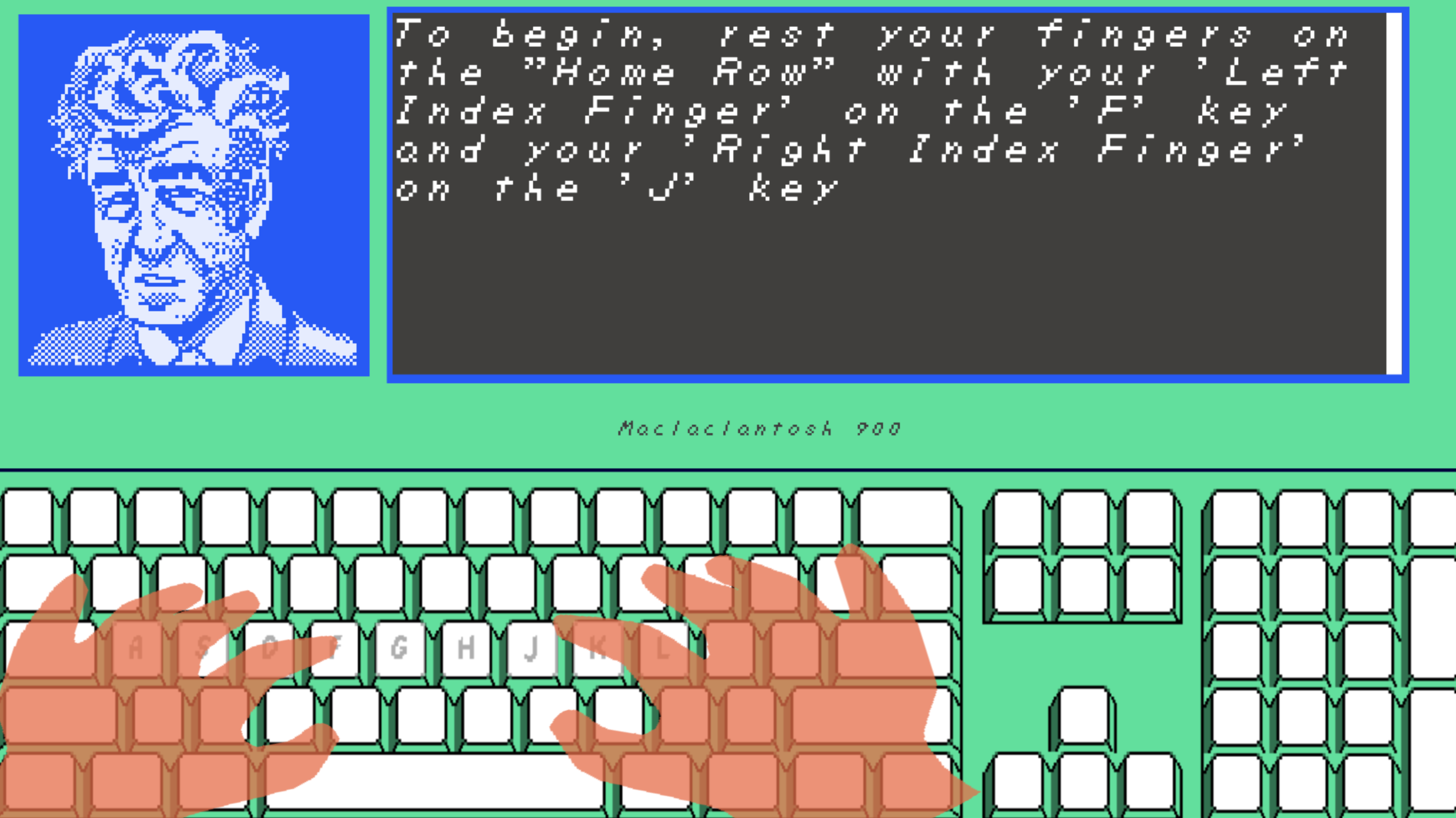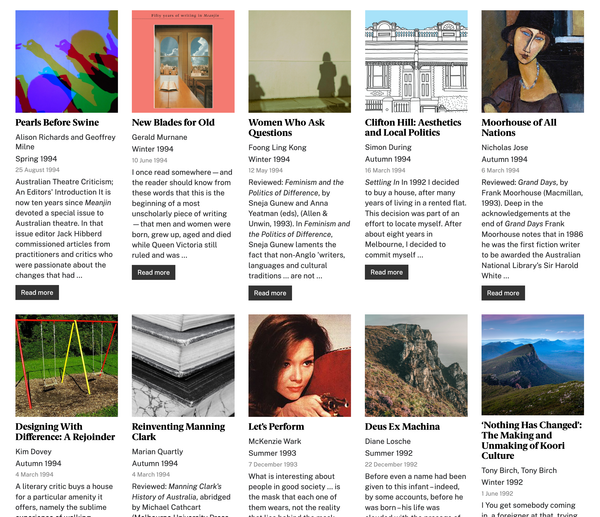The Larger Context
On Gaza, digital provincials, new contrarians, campus protest, and analysis (mine) that goes nowhere
I had intended to devote this newsletter to the digital provincial, or rather, to working out whether the provincial, that highly charged figure in Australian culture, could help me think about the internet. I saw the opportunity to draw a contrast between the very online person and the digital provincial and hoped that it wouldn’t all boil down to generational difference and cultural capital. Truth be told, I was trying to coin a grabby term and so spent too long avoiding the now obvious conclusion that provincialism doesn’t easily yield shiny insights about digital culture.
‘How to define “provincialism”?’ asks Milan Kundera. ‘As the inability (or the refusal) to see one’s own culture in the large context.’ The large context knocked me off my feet this week, which is partly why I lost my grip on the digital provincial. I was transfixed by the reports of violence and terrible human suffering that continue to pour out of Gaza and by the protests at North American universities.
Why this month? The news from Gaza has been shocking since October, indeed it’s been shocking for decades. I have no self-exculpatory homilies here. Perhaps the mannered cosmopolitan makes a knowing remark about the brutal repetitions of imperial violence and moves smoothly to her chosen topic.
I’ve been grappling with knowing remarks and ironic distance as I find my way into writing a critique of a group of contemporary essayists who insist upon the separation of aesthetics and politics. For these writers, there’s no rebuke so heinous as that of earnestness; to venture a political position is always risible. It doesn’t really matter what the position is, it’s taking one that is tedious and unsophisticated. Feminism, anti-racism, protest; dull, dull, dull. It’s all reactionary and glib and it may be that my being swept away by the large context is a function of my growing contempt for these new contrarians, provincials all, at least on Kundera’s logic.
Arwa Mahdawi wrote an extremely effective piece for the Guardian that makes explicit the connection between attacks on pro-Palestinian speech in the US (and around the world) to the suffering in Gaza. It begins like this – ‘if you want to get ahead in life then I have some advice: keep your mouth shut about Palestine’ (my new contrarians have absolutely heeded this advice, by the way) – and it ends like this:
What’s left out of these nonstop discussions of campus safety is this: there isn’t a single safe campus left in Gaza. Israel, with the unconditional aid of the US, has destroyed almost every kindergarten, school, and university in Gaza. It has killed at least 100 Palestinian academics. It has decimated every cultural institution. There are over 13,000 dead children in Gaza who will never have the opportunity of an education. You should not be able to talk about campus safety without mentioning the fact that, thanks to US-backed Israeli air strikes, every campus in Gaza is now a graveyard.
Earlier this year I added my name to an open letter from teachers, researchers, and students connected to literature and creative writing in Australian universities that expressed our sorrow and outrage at the deaths of our Palestinian peers and colleagues and called for an immediate ceasefire. I’m grateful to those colleagues who took such care in drafting the letter, and heartbroken that it remains current:
We believe that writing, storytelling, singing, versifying, and thinking critically about our world through creative expression are essential to human community and its flourishing. The destruction of literature’s condition of possibility in Gaza constitutes the destruction of Palestinians as a people who can tell their stories and hand down their living cultural heritage. One of literature’s key tenets is that all the products of cultural history – fiction, film, archives, histories, artefacts – are foundational for a people to imagine how to build better worlds and possible futures.
Palestinians in Gaza pride themselves on achieving their educational goals despite their extreme living conditions, forced since 2005 to inhabit an enclosed space. Those aspirations can no longer be realised as every site of higher education has been reduced to rubble. The current Israeli government has ensured that generations of Gazans will not have access to higher education, crippling the future of each Gazan and cruelling prospects of prosperity for Gaza and Palestine as a whole.
Writers continue to show solidarity with Palestinian people. Most shortlisted authors withdrew their books from the PEN Literary Awards this year, outraged by the organisation’s lacklustre response to the crisis in Gaza, such that the 2024 awards were shut down altogether this week. This decision to withdraw books is a courageous one. Yes, it is a symbolic show of solidarity, but it is one that is likely to have genuine economic and reputational consequences in precarious times for writers. And what a coda: the estate of Jean Stein mandating that the $75,000 prizemoney for the 2024 PEN/Stein award be donated to the Palestinian Children’s Relief Fund. (If you want to make a donation to the PCRF, you can do so here.)
As I write this, the staunch Columbia protesters remain in place, undeterred by Mike Johnson, Chuck Schumer and the cops, as do thousands around the country. (I recommend this LRB comment by Columbia literary prof Bruce Robbins.) City police and state troopers have been arresting protestors at the University of Texas, Austin. Students at numerous other US campuses have been punished for their participation in protests calling for a ceasefire and for their universities to divest from companies with ties to Israel: arrests, expulsions, suspensions. Will repulsive Republicans like Tom Cotton and Josh Hawley get their wish granted and see the National Guard roll into universities? What will desperate Democrat strategists make of it all? Will they stop worrying about the way Gaza is eroding their support among young people if the Stormy Daniels hush money trial lowers Trump’s approval ratings?
And meanwhile, in Rafah and across Gaza, children are dying, buildings are being bulldozed, and everyone is hungry. (I also recommend this account by a Palestinian teenager of standing by as your house gets demolished by Israeli bulldozers, published this week in The Nation.) People around the world, including in Israel, are calling for a ceasefire. When will the governments of Australia, Canada, the US, all of them, stop supporting the annihilation of Palestinian people? Ceasefire, ceasefire, ceasefire.

And what of the digital provincial? I have been thinking an awful lot about the meaning of provincialism since arriving in Canada a year ago. The very word provincial can provoke in Australians a defensive shudder, an acculturated reflex that is not so different from a cringe. I have been reading Ivor Indyk’s beautiful essays on provincialism and the Australian literary imagination and scouting for better answers to the questions I am often asked about the similarities and differences between Australia and Canada. It’s my impression that the word provincial is taken less often as an insult round here though I have only the roughest ideas as to why. At any rate, provincial is a word difficult to avoid in Canada, because the country is divided into provinces and territories. In British Columbia, it is provincial government this, provincial authority that, provincial funding all over the place, even for the arts, if you can believe it.
The word provincial doesn’t appear in A.A. Phillips’ classic 1950 jeremiad on the cultural cringe but it’s clear enough that his mid-century intellectuals fear being tarred as provincials. Phillips writes, ‘There is a certain type of Australian intellectual who is forever sidling up to the cultivated Englishman, insinuating: “I, of course, am not like these other crude Australians; I understand how you must feel about them; I should be spiritually more at home in Oxford or Bloomsbury.”’ This species is not extinct. There is scope for theorising how digital platforms enable cringe-afflicted Australians to parlay their schtick to a global audience and to amplify this ‘spiritually more at home in Oxford or Bloomsbury’ (or Berlin or Brooklyn) business. And yet it’s also true that digital platforms can expose the folly of such behaviours and at once facilitate dialogues, interactions and communities that are not defined by national borders, and in doing so erode the provincial mindset. The provincial is, I think, fundamentally a gendered and racialised figure, a man of empire who understands himself, for better or worse, in relation to the metropolitan centre. And if anything has made Australian culture less provincial since Phillips’ day, it is surely migration - though I suppose it would be possible to argue simultaneously that the response of large groups of white Australians to migration, cultural nationalism based on nostalgia for a sentimental fantasy of a lost monoculture, has been essentially provincial. I’m open to persuasion on all this; it seems to me that the term provincial also forecloses a reckoning with colonialism in that it cannot comprehend the notion of colonised lands and people being at the centre of the world rather than its periphery. The term may be anachronistic. All of which is to say that to apply provincialism to contemporary culture requires care and many, many caveats.
What prompted me to go down this rabbit-hole were two portraits of digital life recently published in the New York Times. If the concept of the digital provincial has any traction at all, it’s in opposition to the very online person, someone who understands the codes of behaviour and language online, who is sensitive to the nuances of subtweets and memes, a courtier, if you will, of the platforms. Yes, I hit a dead-end, nevertheless the contrast between these two portraits still amuses me.
The first, a self-portrait by David Brooks titled, Why Is Technology So Mean To Me?. I do not recommend anybody read it. Summary: David Brooks struggles with his devices. Sample: ‘We bought a new printer, but it’s snooty. Asking it to print something is like applying to Harvard.’ Brooks was lambasted for this piffle, rightly so. His foolishness and narrowmindedness lie not in being unable to connect his devices but in writing about it. This surely invites the disdain of every reader under sixty, and probably most over that age too. Gaza is in ruins, Trump is on trial, the planet is heating – and David Brooks wants to talk about not being able to charge his phone.
The second, a profile of Rusty Foster, aka the author of Today in Tabs. Foster epitomises being very online and this profile spells out how being very online has nought to do with where you live. The headline points to the way digital culture upends conventions about the relationship between the metropolis and the periphery: ‘From A Tiny Island In Maine, He Serves Up Fresh Media Gossip’. The gist: quiet guy lives in the boondocks; he is part of the media cognoscenti. In these days of remote work? Can you believe it?
So there you have it: the digital provincial v the very online guy, an ultimately not very fruitful counterpoint, or at least, one that I could not bring myself to contemplate further.
This week Creative Australia published a summary of the findings of research I undertook last year with Sam Ryan into literary journals in Australia. Many of the recommendations deal with the labour rights and conditions of artsworkers. Editors should get paid! Not only would this align with the principle of getting paid for the work that you do, it would, I’m absolutely convinced, lead to better work being published by literary journals and across the board. The State of the Discourse was out of the scope of the Creative Australia research, but the discourse would be better if more people got paid what they were worth! Anyway! I’m pleased to see this research get a boost in the lead-up to the launch of Writing Australia, and hope that it informs a sustainable approach to funding literary journals.
Thanks for reading Infra Dig! Subscribe for free to receive new posts and support my work.
Please do pass on this newsletter if you like it. And if you hate it, tweet about it and do so knowing that I, blissfully off the socials, will know nothing of it. Subscribe if you’re interested in reading more about my failed efforts to theorise the intersection of literature and the internet. I send this newsletter roughly once a fortnight and have no plans to monetize it in order to build my empire.


